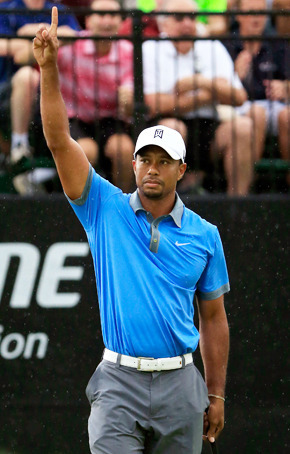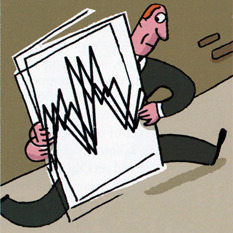John Cassidy's Blog, page 69
August 14, 2013
Bill de Blasio’s Moment: Can He Handle It?

Here’s the good news for New York City Public Advocate Bill de Blasio, my Brooklyn neighbor. Less than a month before the Democratic mayoral primary, on September 10th, he’s leading in the latest Quinnipiac University poll, and liberal billionaires, famous Ivy League professors, big public-sector unions, and music and film celebrities are lining up to endorse him as the second coming of Franklin D. Roosevelt, Fiorello LaGuardia, Mario Cuomo, or Mark Green. (O.K., maybe not the last one. Green, the last public advocate to land the Democratic nomination for mayor, didn’t exactly fare well in his 2001 race against Michael Bloomberg.)
And here’s the bad news for de Blasio. Two weeks before he raced to the top of the Quinnipiac poll, Christine Quinn, who’s now just about clinging onto second place, above Bill Thompson, was leading by six points. And not so long ago, one of the co-leaders was Anthony Weiner, whose chances of being elected are melting away faster than an ice cube on the Coney Island boardwalk. “Follow the bouncing ball, folks,” Maurice Carroll, the director of the Quinnipiac University Polling Institute, commented upon the release of the poll showing de Blasio ahead. “This line-up keeps changing.”
...read moreAugust 13, 2013
The Statistical Debate Behind the Stop-and-Frisk Verdict

As all the world now knows, Judge Shira Scheindlin has ruled that the New York City Police Department’s stop-and-frisk policy amounts to “a policy of indirect racial profiling” that violates the U.S. Constitution. But how did the she reach this conclusion? The answer turns out to be pretty interesting. It involves a number of statistical studies presented to the court by expert witnesses for the plaintiffs (a number of New Yorkers who claimed to have been stopped and frisked without cause) and the defense (the city of New York).
From my reading of Judge Scheindlin’s opinion, which runs to almost two hundred pages, and a brief perusal of some of the expert testimony, the court’s decision seems like the correct one. (Like many New Yorkers, I think the stop-and-frisk policy went way too far and, in some neighborhoods, degenerated into racial harassment.) Still, Judge Scheindlin’s ruling isn’t without its quirks. In one instance, she criticized the conclusions of the plaintiffs’ expert witness; in another, she endorsed the same expert’s work and relied upon it to justify her ruling that stop-and-frisk is indirect racial profiling. If and when the city goes forward with its appeal, the methodology of the studies, and the interpretations that Judge Scheindlin placed upon their conclusions, are sure to be central issues. (For more on Scheindlin, see the piece that Jeffrey Toobin wrote for the magazine about her and the case earlier this year.)
...read moreAugust 12, 2013
Judge Scheindlin Stops and Frisks N.Y.C. Mayoral Candidates

Judge Shira A. Scheindlin’s historic ruling that the New York City Police Department’s stop-and-frisk tactics are unconstitutional has many implications—for policing, for civil rights, and for the daily lives of New Yorkers, particularly the minority youths in high-crime areas who have been the focus of the police’s attention. But one of the most immediate effects will be on the city’s mayoral race, in which the all-important Democratic primary is just four weeks away. All at once, the explosive issues of crime and race have been lobbed into a contest that hitherto had been dominated by Anthony Wiener’s unwholesome proclivities.
In an augur of what is doubtless to come, George McDonald, one of the Republican candidates, said on Twitter, “One misguided liberal judge is endangering the safety of all New Yorkers. Appeal, Appeal, Appeal!” Mayor Bloomberg, in his press conference, vowed to do just that, in the United States Court of Appeals for the Second Circuit. He argued that Scheindlin’s ruling ignored legal precedent and the fact that the stop-and-frisk program had saved “countless lives,” adding: “She ignored the real-world reality of crime.”
...read moreAugust 9, 2013
A-Rod or Tiger: Who Is Your Favorite Sporting Villain?

With the red-hot Detroit Tigers at Yankee Stadium this weekend, and the P.G.A. Championship, the last major golf tournament of the season, playing out in Rochester, New York, sports-loving types will be treated to the spectacle of two great athletic figures, Alex Rodriguez and Tiger Woods, who are both seeking redemption.
Each has a sound claim on being the best player of his era in his respective sport, and each is chasing a historic record. With six hundred and forty-seven career home runs, A-Rod is just thirteen behind Willie Mays on the all-time list, and if he weren’t weighed down with injuries and a performance-enhancing-drug scandal, he would also be within striking distance of Hank Aaron and Barry Bonds, the all-time leaders. Tiger has fourteen major championships to his name, just four shy of Jack Nicklaus, and in recent months he’s looked something like his old self, winning five tournaments—one of them, just last week, by seven shots.
...read moreAugust 8, 2013
The Justice Department’s “War” on Wall Street: Still No Criminal Charges

It took them a while, but the Feds are finally going after some of the country’s biggest banks for alleged wrongdoing during the great housing and credit bubble. In the past few days, the Department of Justice has sued Bank of America for willfully understating the risks attached to hundreds of millions of mortgage-backed securities it sold in 2007, and J. P. Morgan Chase has revealed that two different U.S. attorneys’ offices, one in California and one in Philadelphia, are investigating whether it broke securities laws and duped investors with some of the mortgage deals it put together.
But while the new cases are significant and likely to go on for some time, they don’t answer the question of whether anybody on Wall Street will ever end up in court, or face the possibility of prison time, on criminal charges arising from the mortgage mess. My take: there is no need for anyone on Wall Street to lose much sleep, and that includes Brian Moynihan, the chief executive of Bank of America, and Jamie Dimon, the head of J. P. Morgan. About the worst that is likely to happen is that the two big banks will be forced to pay some hefty fines, which, with both making billions of dollars of profit in the latest quarter, they can easily afford.
...read moreAugust 7, 2013
The Washington Post: Why Jeff Bezos and Not Warren Buffett?

Among the many questions about the sale of the Washington Post to Jeff Bezos, here are a couple I haven’t seen discussed much, except in a post at Fortune on Tuesday: Why didn’t Warren Buffett buy the paper? And what does it mean that he passed it over?
Once the Graham family decided to sell, it’s unthinkable that the legendary investor didn’t get a chance to put in a bid. After all, he served on the board of the Washington Post Company for more than two decades, and the huge conglomerate he runs, Berkshire Hathaway, has been the largest outside shareholder in the Post Company since the nineteen-seventies. (The value of Berkshire’s stake in the company rose to about a billion dollars after the news of the sale, from which Berkshire reportedly stands to make about fifty million dollars.) And in recent years, Berkshire has bought a bunch of newspapers, including Buffett’s local one, the Omaha World-Herald. In his annual letter to Berkshire’s shareholders this year, Buffett wrote, “I love newspapers and, if their economics make sense, will buy them even when they fall far short of the size threshold we would require for the purchase of, say, a widget company.”
...read moreAugust 6, 2013
Bezos and the Washington Post: A Skeptical View

The first and only time I’ve seen Jeff Bezos up close was in 2004, at the White House Correspondents’ dinner. If I remember correctly, and I think I do, he was being led into the Vanity Fair-Bloomberg after-party by Roxanne Roberts, a longtime writer for the Washington Post’s Style section. A skinny, balding, fidgety fellow, he seemed a bit out of place in a black tie and a tux, smiling awkwardly as he shook hands and chatted with the capital’s power brokers and visiting celebrities.
...read moreAugust 5, 2013
Wall Street After Fabulous Fab: Business As Usual

For anybody interested in the great financial crisis and its aftermath, there were three bits of news worthy of inspection last week. Taken together, the message they sent was depressing and somewhat alarming. Five years after the collapse of Bear Stearns and Lehman Brothers, it’s back to business as usual on Wall Street—or, at least, parts of it.
First a quick word about Fabrice (Fabulous Fab) Tourre, the former Goldman Sachs trader, who was found liable of helping his former bosses at Goldman put together a rigged mortgage deal. Juries composed of ordinary people who don’t have any financial training aren’t necessarily the best judges of complicated shenanigans carried out on Wall Street. Often, though, they get things right, and that’s what happened here. Brushing aside Tourre’s defense that he did nothing wrong, the jury found him liable on six of seven counts of securities fraud, and they also made clear that the bigger culprit was Goldman.
...read moreAugust 2, 2013
The Economy Has Hit a Sticky Patch—But Don’t Blame Obamacare

The headlines from Friday’s job report are that modest job growth continued in July—the monthly payroll figure was up by a hundred and sixty-two thousand—and the unemployment rate dipped to 7.4 per cent, which, the White House was quick to point out, is the lowest figure since December, 2008. That’s good news, as far as it goes. But the underlying reality is that the U.S. economy has hit a sluggish patch, as tax hikes, the sequester, and recent statements from the Federal Reserve have combined to restrain spending.
It’s not as if the economy is plunging into another recession, but hopes that it would finally achieve “takeoff speed”—a rate of growth at which it would no longer need extensive government support—have again been disappointed. In the past few months, a series of buoyant job reports have disguised this reality, leading some analysts to believe that households and firms were shrugging off the tightening policies. Based on this sort of thinking, the consensus on Wall Street was that the new payroll figure would come in at close to two hundred thousand.
...read moreAugust 1, 2013
In Defense of Leakers: Snowden and Manning

On the day that Edward Snowden finally left Moscow’s airport in a taxi to take up Russia’s offer of temporary asylum and the sentencing portion of Bradley Manning’s trial continued, it is worth restating what should be obvious. Leaking classified information is a crime, and it can be damaging to the national interest; but, in some circumstances, it can also be a patriotic and useful act that helps bring about necessary reforms.
Setting aside Snowden’s personal odyssey—he’s been holed up at Sheremetyevo Airport since June 23rd—the documents he released detailing the National Security Agency’s spying programs, domestic and global, have already had a transformative effect. For decades, Congress has adopted a hands-off and pusillanimous approach to the N.S.A., appropriating vast sums for its operations—its budget remains classified, but it’s reportedly about ten billion dollars a year—and not examining too closely how this money was spent. As the agency sought to expand its domestic surveillance programs in the aftermath of 9/11, Congress, by passing successive versions of the Patriot Act and other measures, actively enabled it to broaden its remit under the catch-all justification of countering terrorism.
...read moreJohn Cassidy's Blog
- John Cassidy's profile
- 56 followers



